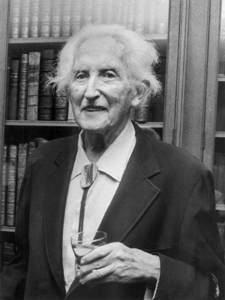Erik Erikson still has something to say

Erik Erikson, the psychologist who re-envisioned the human life cycle as a series of developmental stages, described the “identity crisis,” and popularized the genre of psychobiography with his books on Martin Luther and Mohandas Gandhi, would have been 100 years old on June 15.
From 1960 to 1970, Erikson taught at Harvard as professor of human development and lecturer in psychiatry. His undergraduate course, “The Human Life Cycle,” was one of the most popular at the College. Erikson died in 1994 at the age of 91.
The following essay was presented by Erikson on Sept. 24, 1969, in Appleton Chapel as part of Morning Services. In it, Erikson expresses his thoughts about the first lunar landing, which had taken place two months before. The piece was first published in “A Way of Looking at Things: Selected Papers from 1930 to 1980” by Erik Erikson, edited by Stephen Schlein (W.W. Norton & Co., 1995). Perhaps at a time of year when so many young people are leaving old worlds behind and striking out on new adventures, Erikson’s thoughts on mankind’s “giant step” may have special significance. – By Ken Gewertz
Landing on the Moon (1969)
This morning I would like to speak about the landing on the moon, for there is something I must get off my chest. You see, I was asked by a prominent newspaper to state my anticipatory reaction to the expected moment when the first man would set his foot on the moon. This statement was to be published after a man had, indeed, succeeded in landing and, of course, in taking off again. I, like others, did have some thoughts on the subject, but I could not get myself to send them off. The chances our men were taking were too great to permit anticipatory triumph or clever reflection. Furthermore, the well-known names on the list I was asked to join all belonged to individuals over sixty-five. There was no woman among them. What, I wondered, could we old men say about this event, whether it succeeded or whether if failed disastrously? Our language has served to celebrate other kinds of adventures and to mourn other horrors. And indeed, when the event finally did come off, in view of five hundred millions of people, the viewed fact had a simple grandeur so altogether new that one could only react with a mixture of neighborly pleasure and religious awe, and this in spite of the fact that the highest-ranking commentator flatly stated within the hearing of all these millions that the week of the moon trip had been the greatest since creation. This is not at all what I felt. On the contrary, this statement makes it necessary for me to express myself after all. So please permit me to use this occasion to say what I would have said.
The triumph we witnessed belonged to the test pilots. What when we were young seemed a matter of pure imagination because it was, in fact, unthinkable these disciplined men actually did with a friendliness and a sureness that almost amounted to a trained lack of individual imagination. And indeed, they had learned to trust an army of programmers who had made certain exactly what was to be expected from moment to moment between the earth and the moon and back. One can only salute this teamwork with deep respect because the discipline thus learned is absolutely necessary to keep a future technological world within safe and thinkable bounds. Only a hijacker could wish to weaken such discipline of this moment.
But these men can test only the extent to which men can become the superbrains of machines invented by brains. They cannot test the extent and the limits of the motivations which will decide whether the lethal design which all human conquest has helped to spread – in the name of salvation, of liberation, of progress, and, yes, even of evolution – will be extended to what once was known as the heavens. As long as any nation can live affluently in the safe knowledge of a comfortable margin of overkill, there can be little trust in any nation’s expansion, spectacular as may be the deed or admirable as may be the men who test its mechanics and are tested by it.
Around the time of the moon landing we held a newborn grandson in our arms. I could not help thinking that every time a child is born, there is potentially the greatest week since creation, and the seven seas and the outer spaces pale before its message. Science and insight now make our progeny a matter of considered choice and also of the promise that each child deliberately planned to be born will be brought up to feel at home in his body, mind, and senses so that he may be terrified never by men but only by what in truth is terrible in and about human existence. Without that priority on earth, all landings elsewhere remain footless.
But in the end, what we are learning and teaching will help create truly relevant priorities only by being gathered into a new kind of religiosity. And here, I think, the conquest of the outer space may yet help in a paradoxical way: That men now invade the boundaries of the heavens as concrete goals of science could force man at last to center heaven down on earth, which has, in fact, so patiently and tormentedly waited for it. For the kingdom, as I read Christ’s words, has always been within each of us, if we can only learn to face it – and to share it.
Presented at the Appleton Chapel, Harvard University, Sept. 24, 1969.




